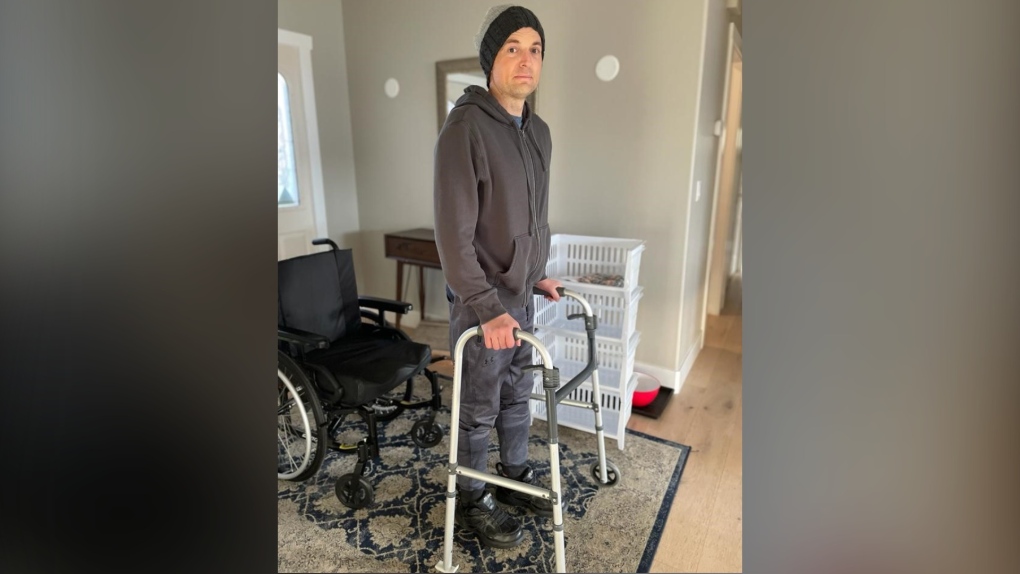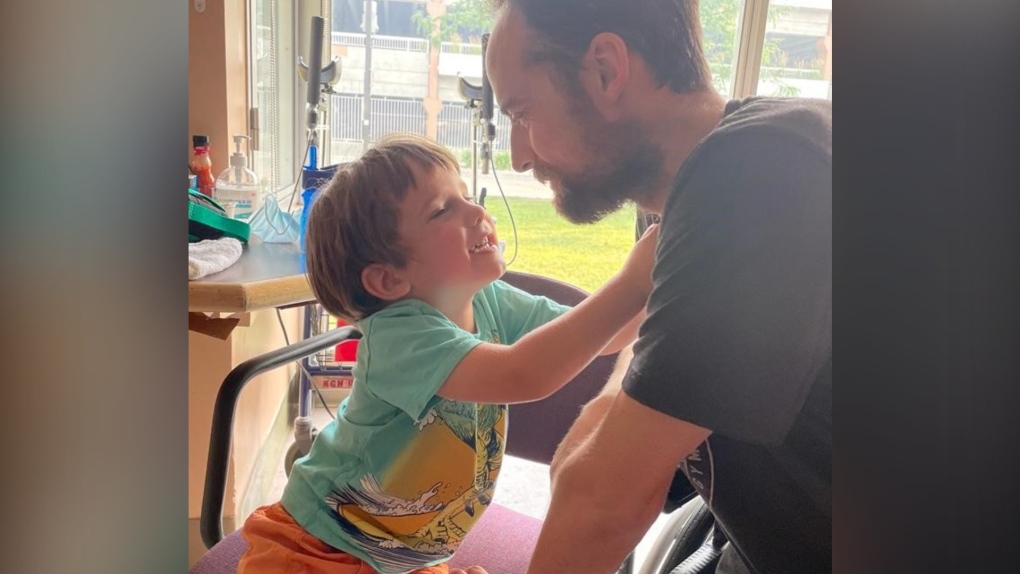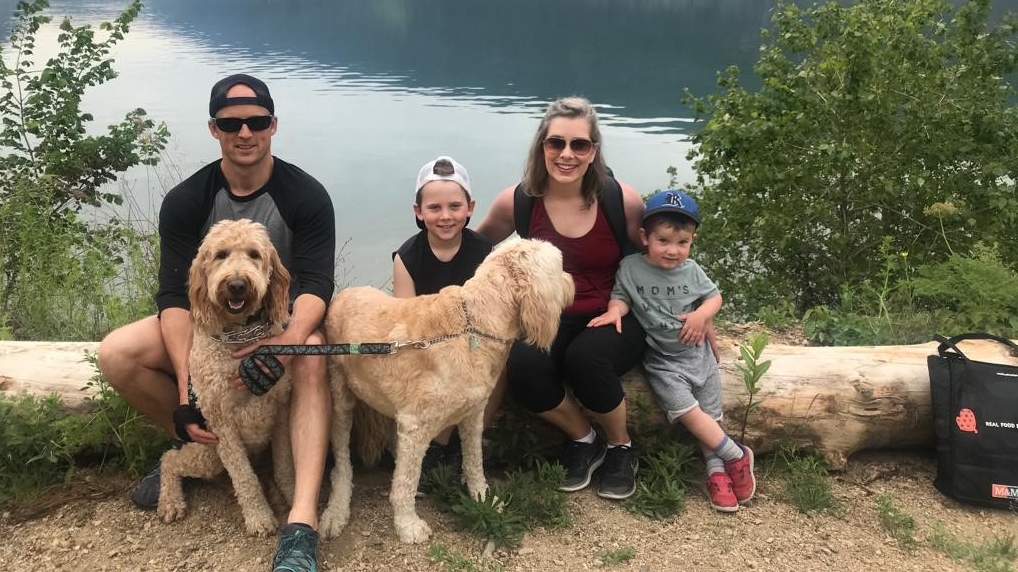'It's vindicating': B.C. man to receive compensation for COVID-19 vaccine injury
Ross Wightman is walking again.
But the 40-year-old B.C. resident now needs special braces for his legs.
“I have basically no muscle or nerve movement or activity below my knees at this point,” he said. His hands also have nerve damage.
“Both hands… they’re curled in,” he explained during an interview with CTV News. “That makes doing pretty much everything a challenge,” added the 40-year-old former pilot and realtor from Lake Country.
“I’m constantly dropping things on the floor. Phones, cutlery, you name it, I drop it.”
More than a year after becoming partially paralyzed following his COVID-19 vaccine, Wightman has become one of the first in the country to be approved for compensation through the federal Vaccine Injury Support Program.
“It’s vindicating. That’s kind of the first thought that came to mind,” he said.
Wightman developed a rare, neurological disorder called Guillain-Barre Syndrome after receiving the AstraZeneca vaccine in April of 2021.
“My world got flipped upside down,” he said.
The most recent available data from the BC Centre for Disease Control, indicates 10 people have been hospitalized with GBS after a COVID-19 vaccine between the start of the vaccine program in 2020 and March of 2022. All have been released from hospital.
“I had full facial paralysis. I couldn’t smile, show my teeth or anything like that. I could barely close one of my eyes,” Wightman said.
“I had no leg function. I was paralyzed from the waist down,” he said.
Wightman spent a total of 67 days in hospital.
Langley’s Shawn Muldoon developed serious blood clots after getting the AstraZeneca vaccine.
He is still not able to work and still waiting for compensation.
“I’m a bit baffled by it, to be honest,” said Muldoon. “I feel like I’m past the frustrated stage. I just don’t know what’s happening with the process anymore.”
'IMMENSE' MENTAL IMPACT ON ENTIRE FAMILY
Wightman did not disclose the exact dollar amount he received from the compensation program but did say it was not the maximum which he said is set at $248,000.
“We’re kind of somewhere in the middle of what’s being offered,” he said.
He also said he is eligible for income replacement.

It’s been a difficult time for his entire family, including his wife who has had to take on a much greater workload, he explained.
“The mental impact on immediate family members is just immense. You can’t really measure that,” Wightman said.
While he’s relieved to be getting funding, he said the real victory will be seeing improvements in his health.
“I’ve got a long road to go, but I’ve got a lot of support with my wife and family and we’re all up to the challenge.”

Four-hundred people have put in vaccine injury claims in Canada. Less than five have been approved according to data from the Vaccine Injury Support Program which hasn’t been updated since November 30, 2021.
In email to CTV News, Health Canada said it, along with the Public Health Agency of Canada “…continues to advise that the benefits of vaccination with a vaccine approved in Canada outweigh the potential risk of disease.
CTVNews.ca Top Stories

B.C. tenants evicted for landlord's use after refusing large rent increase to take over neighbouring suite
Ashley Dickey and her mother rented part of the same Coquitlam duplex in three different decades under three different landlords.
Mountain guide dies after falling into a crevasse in Banff National Park
A man who fell into a crevasse while leading a backcountry ski group deep in the Canadian Rockies has died.
Expert warns of food consumption habits amid rising prices
A new survey by Dalhousie University's Agri-Food Analytics Lab asked Canadians about their food consumption habits amid rising prices.
MPP Sarah Jama asked to leave Ontario legislature for wearing keffiyeh
MPP Sarah Jama was asked to leave the Legislative Assembly of Ontario by House Speaker Ted Arnott on Thursday for wearing a keffiyeh, a garment which has been banned at Queen’s Park.
Charlie Woods, son of Tiger, shoots 81 in U.S. Open qualifier
Charlie Woods failed to advance in a U.S. Open local qualifying event Thursday, shooting a 9-over 81 at Legacy Golf & Tennis Club.
Ex-tabloid publisher testifies he scooped up possibly damaging tales to shield his old friend Trump
As Donald Trump was running for president in 2016, his old friend at the National Enquirer was scooping up potentially damaging stories about the candidate and paying out tens of thousands of dollars to keep them from the public eye.
Here's why provinces aren't following Saskatchewan's lead on the carbon tax home heating fight
After Prime Minister Justin Trudeau said the federal government would still send Canada Carbon Rebate cheques to Saskatchewan residents, despite Saskatchewan Premier Scott Moe's decision to stop collecting the carbon tax on natural gas or home heating, questions were raised about whether other provinces would follow suit. CTV News reached out across the country and here's what we found out.
Montreal actress calls Weinstein ruling 'discouraging' but not surprising
A Montreal actress, who has previously detailed incidents she had with disgraced Hollywood producer Harvey Weinstein, says a New York Court of Appeals decision overturning his 2020 rape conviction is 'discouraging' but not surprising.
Caleb Williams, Jayden Daniels and Drake Maye make it four NFL drafts with quarterbacks going 1-3
Caleb Williams is heading to the Windy City, aiming to become the franchise quarterback Chicago has sought for decades.

































